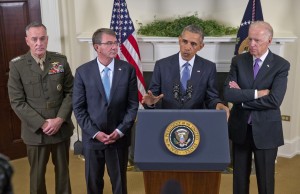
Obama weighs moving U.S. troops closer to front lines in Syria, Iraq
President Obama’s most senior national security advisers have recommended measures that would move U.S. troops closer to the front lines in Iraq and Syria, officials said, a sign of mounting White House dissatisfaction with progress against the Islamic State and a renewed Pentagon push to expand military involvement in long-running conflicts overseas.
The debate over the proposed steps, which would for the first time position a limited number of Special Operations forces on the ground in Syria and put U.S. advisers closer to the firefights in Iraq, comes as Defense Secretary Ashton B. Carter presses the military to deliver new options for greater military involvement in Iraq, Syria and Afghanistan.
The changes would represent a significant escalation of the American role in Iraq and Syria. They still require formal approval from Obama, who could make a decision as soon as this week and could decide not to alter the current course, said U.S. officials who spoke on the condition of anonymity because the discussions are still ongoing. It’s unclear how many additional troops would be required to implement the changes being considered by the president, but the number for now is likely to be relatively small, these officials said.
The recommendations came at Obama’s request and reflect the president’s and his top advisers’ concern that the battle in Iraq and Syria is largely stalemated and in need of new ideas to generate momentum against Islamic State forces.
The list of options that went to the president was generated by field commanders and vetted by the president’s top national security advisers, including Carter and Secretary of State John F. Kerry, in a series of meetings over the past few weeks.
More costly and ambitious measures, such as no-fly zones or buffer zones that would require tens of thousands of ground troops to effectively protect innocent civilians, did not receive the backing of any of Obama’s top policy advisers. Democratic presidential front-runner Hillary Rodham Clinton has said that she favors a no-fly zone in Syria.
Senior U.S. officials, however, warned that such measures had the potential to put the United States in direct conflict with the Syrian regime and the Russian and Iranian forces backing it.
The recommendations delivered to Obama would not put U.S. forces in a direct combat role. But they reflect a major shift in mission for the Pentagon, where as recently as last year officials were focused on winding down U.S. wars and on emerging threats such as China’s military rise.
These latest deliberations come shortly after the president decided to keep U.S. troops in Afghanistan past 2016, ending his ambition to bring service members home before he leaves office.
Obama chose Carter for the Pentagon’s top job — and dismissed his predecessor — because the president wanted a leader who could push the military to generate better and more creative options in the battle against the Islamic State. For Carter, that has meant negotiating the often conflicting demands of a president who views the threats emanating from places such as Iraq, Syria and Afghanistan as real but remains determined to keep American forces from being pulled too deeply into costly and intractable foreign conflicts.
The recommendations that went to Obama in a memo last week reflect the president’s conflicting impulses. The proposal would put a small number of U.S. advisers on the ground in Syria for the first time since the United States began military operations against the Islamic State last year. The Pentagon has sent small Special Operations teams into Syria for lightning-quick missions several times since the war began in 2011. The newly proposed Special Operations forces would work with moderate Syrian Arab rebels and possibly some Kurdish groups, such as the People’s Protection Units, or YPG, that have scored some recent victories against the Islamic State.




